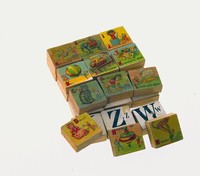 Image from Europeana via Digitale Collectie
Image from Europeana via Digitale CollectieIt is well known that puzzles can be important tool in your youngsters development. Exactly what is not well known is the why and also the how. The first part why is it that a great number of childcare professionals are insistent that puzzles form a fundamental portion of your child’s development?
Firstly, interacting with puzzles help children develop basic physical skills. Motor skills, both gross and fine, are encouraged. For young children, this might be something as simple as stacking blocks on top of each other. This promotes basic movement, or gross motor skills. Fine motor skills involve children developing small movements, such as grasping a jigsaw piece in their fingers. These motor skills are vital for children when it comes to holding a pencil and writing. Developing these skills also allow the child’s hand-eye co-ordination skills to grow. The child is identifying a desired action with their brain, and as subsequently manipulating the puzzle piece with their hands.
Puzzles are an excellent way to help develop a child’s cognitive skills. Cognitive skills are like learning skills; they are how a child processes sensory information that they take in from the world around them. Puzzles encourage children to analyse and understand a problem. When a similar problem is encountered again, the child is encouraged to remember a previous solution. In this way, the child must actually think about the problem. In the case of a jigsaw puzzle, they must analyse the shape of a missing piece, remember it, and find a match amongst the available pieces. Cognitive skill development is an ongoing process for children up to their teen years, and the use of puzzles helps to encourage this development.
Finally, puzzles also help with the development of emotional skills. When children are presented with a problem that they cannot immediately resolve, their first reaction is often to get upset. By presenting a child with an appropriately difficult puzzle, you can teach the child patience. When they get upset, they will not be able to solve the puzzle. However, by being patient, using their cognitive and physical skills, they can work out the solution. Children, like adults, feel an enormous sense of achievement when they work out a problem for themselves. In this regard, it is important to actively encourage your child when they are trying to work out a problem, and to praise them when they make progress. As the child gets older, they will have learned that a patient approach to a problem will help them resolve the issue.
The benefits of puzzles, particularly for early child development, cannot be overstated. They help children develop physically, mentally and emotionally. A child who learns to love puzzles will relish the challenge posed by difficult questions in school. They are less likely to see these problems as work, but as a puzzle with a solution to be figured out. Encourage your children to play with puzzles, and you will both reap the rewards.